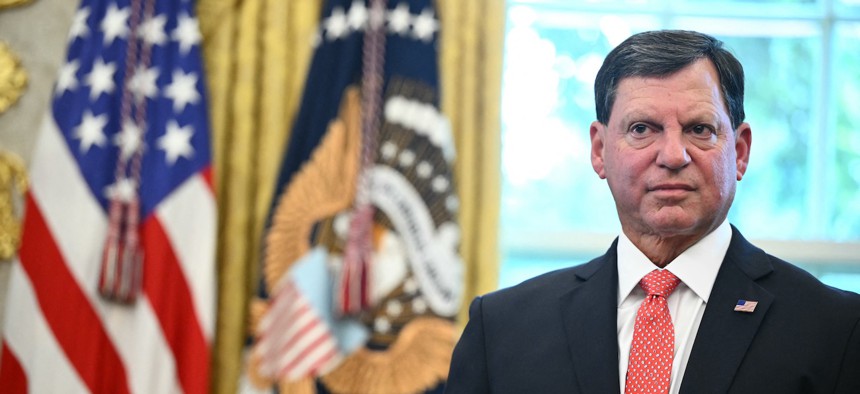
Social Security Administration Commissioner Frank Bisignano was confirmed in May. MANDEL NGAN/AFP via Getty Images
SSA chief Bisignano faces probe from Wyden and Warren over Fiserv stock and federal contract concerns
The Social Security commissioner has come under fire in recent days as shares in his former company depreciated shortly after his tax-advantaged divestiture from the financial technology firm.
A pair of Democratic senators on Thursday initiated a probe of Social Security Commissioner and Internal Revenue Service CEO Frank Bisignano’s transition from the financial industry to government, following recent news about the company’s underperformance and its procurement of a federal contract under murky circumstances.
Shares in Fiserv, a financial technology that processes credit and debit card payments on behalf of businesses and financial institutions, fell more than 40%--or $30 billion in market value--last week after CEO Mike Lyons backtracked on earnings forecasts originally issued by his predecessor, Bisignano.
Upon his confirmation to serve atop the Social Security Administration in May, Bisignano divested from his investments in the payment giant, as required by law. Those sales netted an estimated $530 million, and Bisignano can offset a portion of his capital gains tax burden by reinvesting the proceeds into government securities and other diversified investments. Had he waited until after last week’s sell-off, those shares would have been worth just $229 million.
Fiserv’s recent conduct is now the subject of a class action lawsuit filed by investors who purchased the company’s stock between July 2024 and July 2025.
In a letter to Lyons, Sens. Ron Wyden, D-Ore., and Elizabeth Warren, D-Mass., the top Democrats on the Senate Finance and Banking committees, respectively, demanded information about the circumstances that led to Fiserv’s issuance of overly rosy revenue projections and the subsequent decision to reevaluate those goals.
“At a minimum, Mr. Bisignano appears to have failed to manage Fiserv effectively, and may have misled investors and the public about the company’s financial status, raising concerns about his ability to serve as a key Social Security and IRS official in the Trump administration,” they wrote. “Because of Mr. Bisignano’s mismanagement, many Fiserv investors, including retirees and members of the public, lost money—a fate Mr. Bisignano avoided. Bisignano’s required divestment of company stock helped him avoid about 300 million in losses cause by the stock’s price decline by over 50%.”
According to Lyons’ debrief on a quarterly earnings call with investors last month, Fiserv’s projections relied heavily on growth in the Argentinian market, and the company projected other areas of the business would grow “significantly faster than their historical mid-single digit range” to “compensate” for the expected Argentinian economic slowdown that came to fruition this year.
“Did you or any other Fiserv employee, or any individual working on Fiserv’s behalf, discuss these matters, or any aspect of the Trump administration’s $40 billion Argentina bailout, with any member of the Trump administration?” the lawmakers asked. “Do you have any knowledge of whether Mr. Bisignano discussed these matters, or any aspect of the Trump administration’s $40 billion bailout, with President Trump or any other member of the Trump administration?”
The Democrats also requested information regarding the recent award of the financial agency agreement to administer Direct Express, the federal government’s debit card program for federal beneficiaries who lack a traditional bank account, to Fiserv and Fifth Third Bank. That contract was set to go to Bank of New York-Mellon last fall, but the Treasury Department’s Bureau of Fiscal Service re-awarded it in September.
The Trump administration this year mandated that federal agencies cease issuing paper checks, a decision that has the potential to drive more Americans, particularly Social Security beneficiaries and veterans, to the program.
“During his confirmation process, Mr. Bisignano did not disclose any active contract negotiations between Fiserv or its subsidiaries with the federal government,” Wyden and Warren wrote. “The recent announcement raises questions about what conversations, if any, were occurring at Fiserv regarding Direct Express over the course of 2025, and about Mr. Bisignano’s awareness of and involvement in those conversations.”
Share your experience with us: Erich Wagner: ewagner@govexec.com; Signal: ewagner.47
NEXT STORY: Bisignano draws scrutiny as his former company falters







